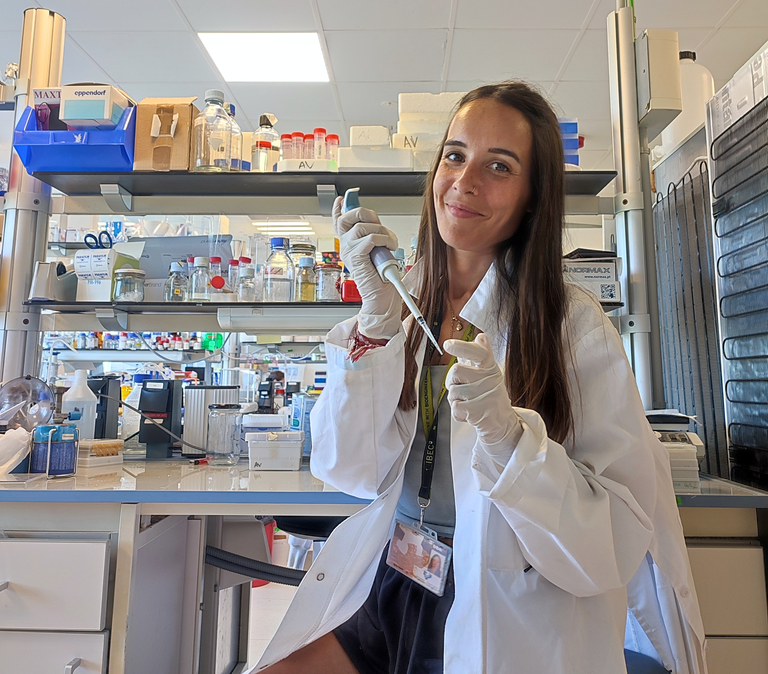“I would like to investigate something crazy or very brave, but it is conditioned by funding”

Eider Núñez Viadero explains why she decided to study biology: “I had very good biology teachers at ESO and high school, and I got the hobby from them.” Now he's a researcher, but at the time he didn't intend to: “I saw myself as a company. But in the end, here I am, and I’m happy.”
To get there, he hasn’t followed the straight line, but has traced his career as opportunities arise. Thus, in his career in biology, he chose microbiology and biochemistry among the electives, but at the end of his career, he entered ecology and the opportunity arose to go to Scotland. There, he went into animal physiology and was given the opportunity to do his thesis. “To do that, I had to do a master’s degree,” he says.
But he took up again the opportunity that had appeared before him: “At that time, there were some scholarships to do some internships at a company or research center here,” he says. “And then I completely switched areas and went to the lab. You know that there are three types of biologists: batted, bottled, and corbated. So I went from being a bouncer to being a baton.”
In fact, he went to work in an epigenetics laboratory. “I worked with DNA, PCR and things like that, and I said, yes, I want to do the thesis, I like it. So I did my master’s degree in biomedicine and had the opportunity to go to Finland to do my master’s thesis. I went into biophysics and I liked it a lot. I had a lot of good friends. It was a small laboratory, but I was very happy. And while I was there, I received several offers to do my thesis. But they were all under investigation in specific projects; they were very closed.”
Suddenly, he received a message from Álvaro Villarroel Muñoz, from the Institute of Biophysics of the UPV/EHU, who gave him total freedom to choose the project. “I was researching epilepsy. And there are just a few cases of epilepsy in my family. Then I realized that it was completely different, but at that moment it caught my attention.” So he did his thesis with her, investigating the molecular aspect of epilepsy. Specifically, they investigate a series of potassium channels that have a direct bearing on the process of epilepsy, in order to gain a deep understanding of its functioning and defects, perhaps thinking that in the future some type of pharmacological treatment will be developed, influencing them.
He received his doctorate in Marseille, France. And again, the change: “I went to do something completely different and now I’m back from Marseille. I’m looking for something in common with what I learned there and what I did here,” he says.
He explains that he worked with the high-speed atomic force microscope in Marseille. “It will now be installed in San Sebastian, but when I met it, in 2018, there were only four in the world. It's very powerful. In fact, instead of taking pictures, he takes videos. You can see the process. And, in biology, in life, this is very important, because life is not static, but dynamic. I compare it to the flight of a bird: you can see the bird in the air in a photo, but you cannot know how it flies. For that, you need the video. And it’s the same with cells, proteins and molecules.” Therefore, he will try to apply this technique to his research at the Institute of Biophysics.
Curiosity, fun and reality
In addition, he also participates in El Vecilio. Vícabe is a network of research centres for young people in research and technological projects, and Núñez works as a guide for workshops: “I like it a lot. Because I think science is super fun, but sometimes you lose that spark in the lab. With young people, on the other hand, you have the opportunity to live science in a fun way, without pressure, and in addition, young people have very good ideas and it is very enriching. In research, the pressure is inevitably there, and going there once a year to get some air and having fun opens your mind.”
Looking ahead, he looks optimistic. He would like to continue his research, although he is very critical of some aspects: “Over time, I’ve realized that the goal, rather than spreading knowledge, is to publish. In the end, we need money to carry out our projects and, in order to obtain financing, they have to evaluate our work. And that’s what they’re based on: how much we’ve published and where. This conditions a lot, since you are forced to dedicate yourself to studies that give quick results. It determines curiosity, what to investigate... I would like to do something crazy or very brave, but I know it must be something feasible. We are all involved in this,” he concludes.
Buletina
Bidali zure helbide elektronikoa eta jaso asteroko buletina zure sarrera-ontzian












